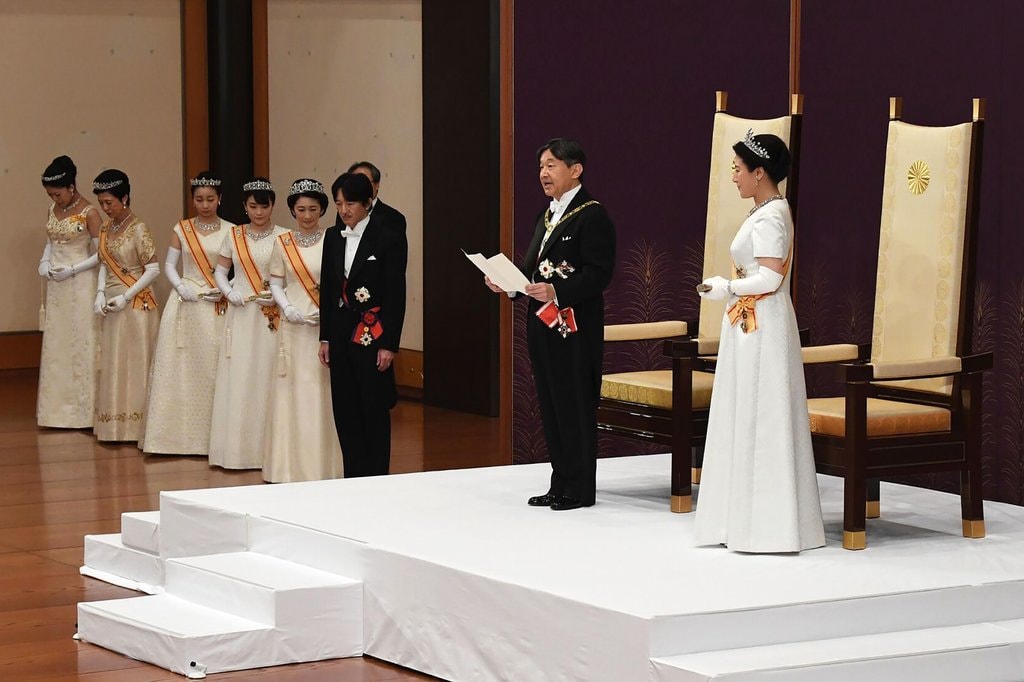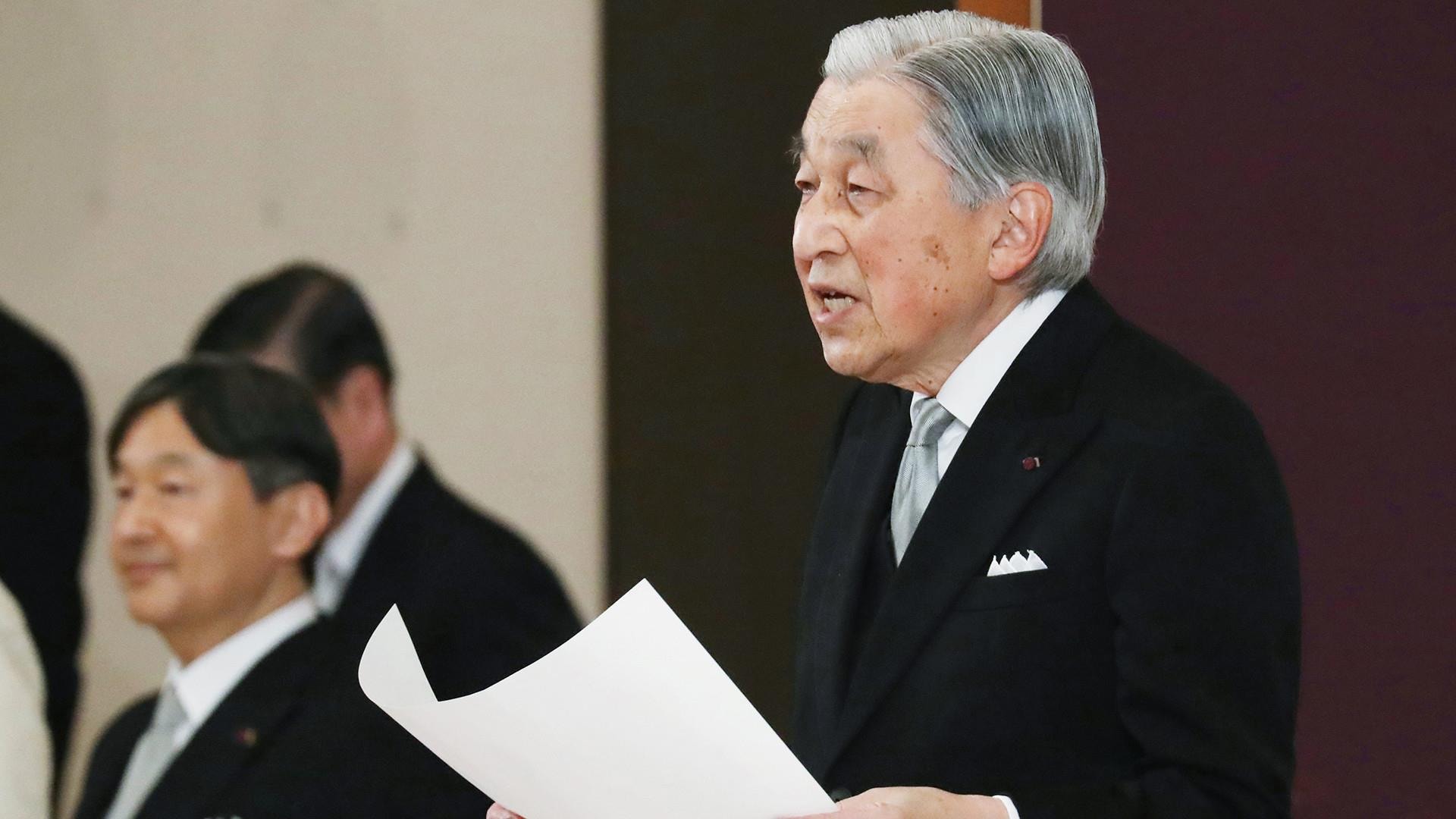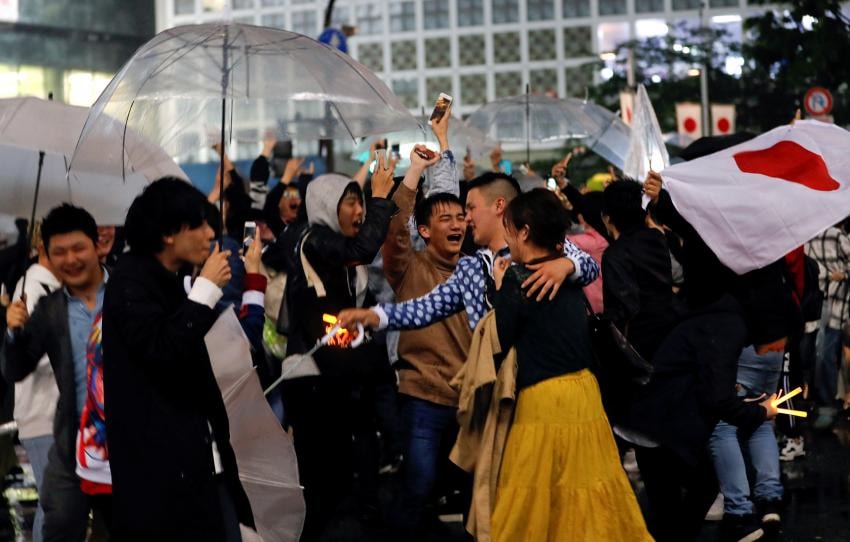Japan: New Era, New Expectations
(Baonghean) - Japan has officially entered a new era - Reiwa when Crown Prince Naruhito ascended the throne after Emperor Akihito's abdication. This is considered a historic event for the Land of the Rising Sun, bringing with it expectations of a bright era for the country on the basis of national harmony, just like the name of the new Reiwa era.
 |
| New Emperor Naruhito speaks for the first time after his coronation. Photo: New York Times |
The era of “harmony”
Crown Prince Naruhito, 59, inherited the Chrysanthemum Throne and became the new Emperor of Japan in a coronation ceremony held at the Tokyo Imperial Palace on the morning of May 1. He is the 126th emperor of the dynasty considered the world's oldest still in existence. The most important and symbolic part of the coronation ceremony is the Imperial Relics Ceremony, which includes the ceremony of receiving the Sword, the Jewel, the Imperial Seal and the Imperial Seal. The Imperial Relics Ceremony is of special significance and is attended by only 26 people, including ministers and representatives of the Japanese Cabinet.
In his first speech to the nation on the day of his coronation, the new Emperor Naruhito vowed to act according to the Constitution, to think and serve the interests of the people. He also pledged to follow in the footsteps of his father, the former Emperor Akihito, who brought the Japanese monarchy closer to the people, especially when natural disasters occurred such as: in Kobe in 1995 after the earthquake that killed nearly 6,500 people or the double earthquake-tsunami disaster that killed nearly 16,000 people in 2011. And the greatest value in the Heisei era that the new Emperor will have to preserve and promote is to help the Japanese people live in peace as in the period from 1989 to the present - for the first time in modern history, Japan has not participated in any war.
The abdication of former Emperor Akihito to the new Emperor Naruhito marks the first time in more than 200 years that a Japanese emperor has abdicated. This event officially closes the Heisei era that began in 1989 and opens the new Reiwa era.
 |
| Former Emperor Akihito abdicates, giving way to new Emperor Naruhito. Photo: AP |
The new era name, Reiwa, is also the first time that Japan's era name has been taken from the country's classical literature instead of Chinese literature as before. In the previous announcement ceremony of the new era name, Japanese Prime Minister Shinzo Abe explained that "Reiwa" originated from Japan's oldest poetry collection, the Manyapa Collection. In the Manyapa Collection, Reiwa means a new spring, spreading peace. Therefore, the choice of the era name Reiwa not only affirms Japan's long-standing cultural values but also entrusts the whole country's hopes for a new period of brilliant development based on national harmony.
As one of the oldest monarchies in the world, with an existence of more than 2 millennia, Japan still maintains the tradition that the kings will choose their own era name during their reign to express their will and goals. The era name of each king aims to set the direction for the coming decades and still plays an important role in the daily life of the Japanese people.
Therefore, many Japanese people also expressed hope that the new Emperor Naruhito, with his youthful energy, will bring new vitality to the Land of the Rising Sun. In the cabinet meeting yesterday morning, Japanese Prime Minister Shinzo Abe sent his congratulations to the new Emperor Naruhito, and expressed his determination to strive to create a prosperous Reiwa era, "creating a bright future for a proud, hopeful and peaceful Japan in the context of a rapidly changing world situation".
Expectations for an economic "boost"
In Japan, politics and the royal family are clearly separated. So the new emperor's ascension to the throne will not theoretically create any significant political changes. However, this event is very symbolic, capable of creating new impulses for economic development.
In fact, many Japanese businesses have quickly taken advantage of the transition between the old and new dynasties as a "unique" opportunity to promote business activities such as producing commemorative coins, launching new tourism products and services inspired by the Reiwa era... Economic experts believe that Japan may witness a breakthrough growth in consumption and investment levels during the period surrounding the coronation of the new Emperor Naruhito, similar to what happened after the former Emperor Akihito ascended the throne in 1989.
 |
| Japanese people joyfully welcome the new Reiwa era. Photo: Japan Today |
However, the Japanese people expect that the change in the era name can promote economic growth in the long term, stemming from the policy orientation and the mindset of the government as well as businesses and people when entering a new era. The new Emperor Naruhito ascended the throne in the context of Japan facing many difficulties such as an aging population, low birth rate, high public debt, and economic growth entering a period of decline after peaking in the third quarter of last year.
In the economic report released last April, the Japanese Government had to lower its economic growth forecast for the first time in the past 3 years. Analysts say that although he does not have the power to directly solve the country's socio-economic problems, the Emperor is a figure who can inspire the image of the country he desires. He can also participate in many symbolic activities, demonstrating the spirit of harmony of the Japanese people such as attending cultural activities, welcoming foreign guests, visiting areas affected by natural disasters, etc.
After the coronation of the new Emperor Naruhito, the Cabinet Office also affirmed the message that Prime Minister Shinzo Abe's administration will prioritize stabilizing economic growth, improving the working environment, listening to people's thoughts for a better society. In recent years, the Japanese government has had many new policies to balance the financial market, reduce inflation, promote economic growth, expand cultural diplomacy to gradually improve the living environment for the people, especially the elderly and education for children. However, due to increasing demand, the economy has not achieved the desired growth rate, Japanese public opinion is hoping for a real breakthrough when entering the new era.
The Japanese government can introduce policies to promote investment in regions such as Southeast Asia, Africa, India, increase the export of high-quality automobiles and agricultural products to North America, affirm its position as a leading automobile manufacturer in the European market... It can be said that with the beginning of the Reiwa Dynasty, the Japanese people are expressing many wishes for a new period of peace and prosperous development with the beginning of an economic breakthrough.


